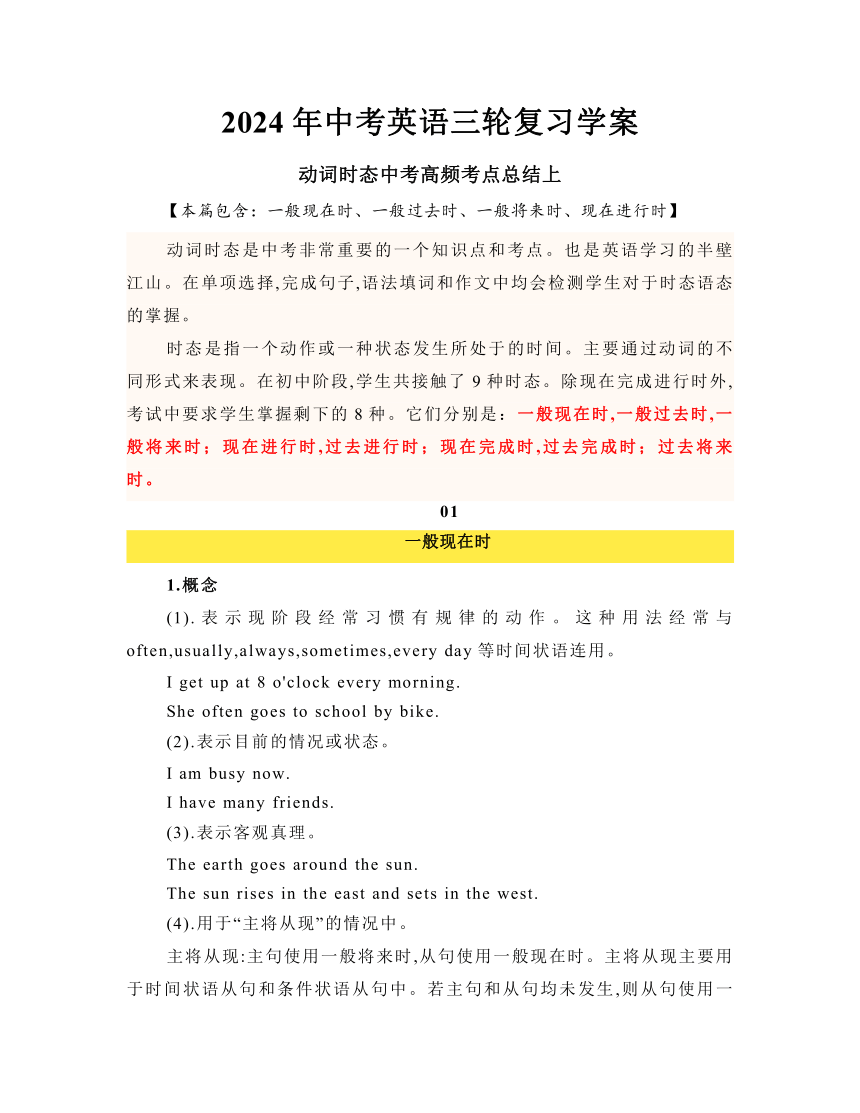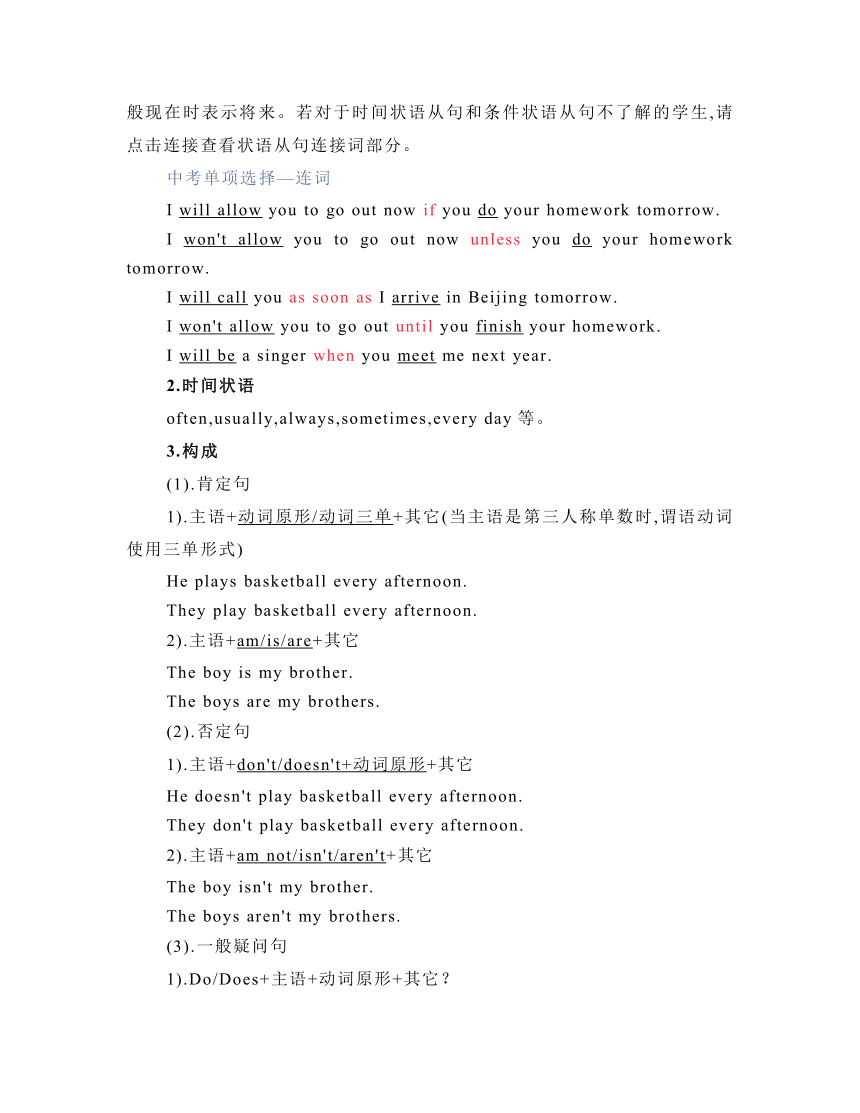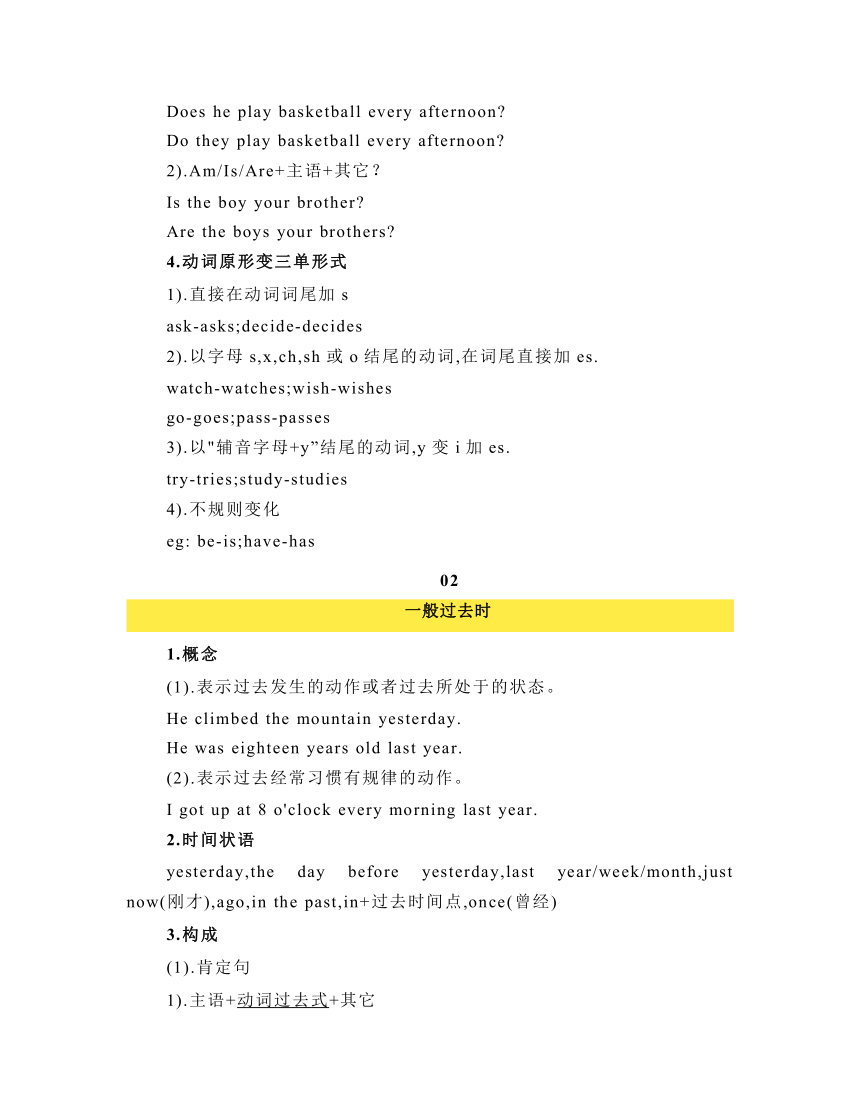2024年中考英语三轮复习学案动词时态中考高频考点总结上
文档属性
| 名称 | 2024年中考英语三轮复习学案动词时态中考高频考点总结上 |  | |
| 格式 | docx | ||
| 文件大小 | 19.4KB | ||
| 资源类型 | 教案 | ||
| 版本资源 | 通用版 | ||
| 科目 | 英语 | ||
| 更新时间 | 2024-03-31 23:03:57 | ||
图片预览



文档简介
2024年中考英语三轮复习学案
动词时态中考高频考点总结上
【本篇包含:一般现在时、一般过去时、一般将来时、现在进行时】
动词时态是中考非常重要的一个知识点和考点。也是英语学习的半壁江山。在单项选择,完成句子,语法填词和作文中均会检测学生对于时态语态的掌握。
时态是指一个动作或一种状态发生所处于的时间。主要通过动词的不同形式来表现。在初中阶段,学生共接触了9种时态。除现在完成进行时外,考试中要求学生掌握剩下的8种。它们分别是:一般现在时,一般过去时,一般将来时;现在进行时,过去进行时;现在完成时,过去完成时;过去将来时。
01
一般现在时
1.概念
(1).表示现阶段经常习惯有规律的动作。这种用法经常与often,usually,always,sometimes,every day等时间状语连用。
I get up at 8 o'clock every morning.
She often goes to school by bike.
(2).表示目前的情况或状态。
I am busy now.
I have many friends.
(3).表示客观真理。
The earth goes around the sun.
The sun rises in the east and sets in the west.
(4).用于“主将从现”的情况中。
主将从现:主句使用一般将来时,从句使用一般现在时。主将从现主要用于时间状语从句和条件状语从句中。若主句和从句均未发生,则从句使用一般现在时表示将来。若对于时间状语从句和条件状语从句不了解的学生,请点击连接查看状语从句连接词部分。
中考单项选择—连词
I will allow you to go out now if you do your homework tomorrow.
I won't allow you to go out now unless you do your homework tomorrow.
I will call you as soon as I arrive in Beijing tomorrow.
I won't allow you to go out until you finish your homework.
I will be a singer when you meet me next year.
2.时间状语
often,usually,always,sometimes,every day等。
3.构成
(1).肯定句
1).主语+动词原形/动词三单+其它(当主语是第三人称单数时,谓语动词使用三单形式)
He plays basketball every afternoon.
They play basketball every afternoon.
2).主语+am/is/are+其它
The boy is my brother.
The boys are my brothers.
(2).否定句
1).主语+don't/doesn't+动词原形+其它
He doesn't play basketball every afternoon.
They don't play basketball every afternoon.
2).主语+am not/isn't/aren't+其它
The boy isn't my brother.
The boys aren't my brothers.
(3).一般疑问句
1).Do/Does+主语+动词原形+其它?
Does he play basketball every afternoon
Do they play basketball every afternoon
2).Am/Is/Are+主语+其它?
Is the boy your brother
Are the boys your brothers
4.动词原形变三单形式
1).直接在动词词尾加s
ask-asks;decide-decides
2).以字母s,x,ch,sh或o结尾的动词,在词尾直接加es.
watch-watches;wish-wishes
go-goes;pass-passes
3).以"辅音字母+y”结尾的动词,y变i加es.
try-tries;study-studies
4).不规则变化
eg: be-is;have-has
02
一般过去时
1.概念
(1).表示过去发生的动作或者过去所处于的状态。
He climbed the mountain yesterday.
He was eighteen years old last year.
(2).表示过去经常习惯有规律的动作。
I got up at 8 o'clock every morning last year.
2.时间状语
yesterday,the day before yesterday,last year/week/month,just now(刚才),ago,in the past,in+过去时间点,once(曾经)
3.构成
(1).肯定句
1).主语+动词过去式+其它
He played basketball yesterday afternoon.
2).主语+was/were+其它
He could play the piano when he was a child.
(2).否定句
1).主语+didn't+动词原形+其它.
He didn't play basketball yesterday afternoon.
2).主语+wasn't/weren't+其它
He wasn't ugly last year.
(3).一般疑问句
1).Did+主语+动词原形+其它?
Did he play basketball yesterday afternoon
2).Was/Were+主语+其它?
Was he ugly last year
4.动词原形变过去式
1).直接在动词词尾加ed
ask-asked;play-played
2).以字母e结尾的动词,在词尾直接加d.
decide-decided;compare-compared
3).以"辅音字母+y”结尾的动词,y变i加ed.
try-tried;study-studied
4).结尾只有一个辅音字母的重读闭音节,双写末尾的辅音字母,再加ed.
plan-planned;stop-stopped
4).不规则变化
动词过去式的不规则变化比较多,在课本上有总结。需要同学们在日常中去积累并进行记忆。
03
一般将来时
1.概念
(1).表示将要发生的动作或者将要所处于的状态。
He will climb the mountain tomorrow.
He will be eighteen years old next year.
2.时间状语
tomorrow,the day after tomorrow,next year/week/month,in the future,in+将来时间点,in+一段时间,right away,at once,soon等
3.构成
(1).肯定句
1).主语+will/shall+动词原形+其它
I shall/will play basketball tomorrow.
I shall/will be eighteen years old next year.
2).主语+am/is/are going to+动词原形+其它
I am going to play basketball tomorrow.
I am going to be eighteen years old next year.
(2).否定句
1).主语+will/shall+not+动词原形+其它.
I shall not/won't play basketball tomorrow.
2).主语+am/is/are+not going to+动词原形+其它
I am not going to play basketball tomorrow.
(3).一般疑问句
1).Will/Shall+主语+动词原形+其它?
Will you play basketball tomorrow
2).Am/Is/Are+主语+going to+动词原形+其它?
Are you going to play basketball tomorrow
(4).will/shall do;be going to do 区别(了解)
1).英国英语中主语是第一人称时常用shall do;美国英语中各人称皆用will do.
2).be going to do 表示有计划,有征兆将要发生的事情,will do 表示无计划,无征兆将要发生的事情。
(5).There be的将来时结构(易错)
1).There will be+其它
There will be a concert on Saturday.
2).There is/are going to be+其它
There is going to be a concert on Saturday.
There are going to be many students in the library.
04
现在进行时
1.概念
(1).表示此时此刻正在发生的动作。这种情况常与now,right now,at this moment,at present等时间状语连用,强调现在正在发生的事情。
I am doing my homework now.
(2).表示在当前一段时间内一直在做的事情。(了解)
I am writing a book these days.
(3).现在进行时表示将来
现在进行时常用在下列词汇中表示马上做:come,go,leave,start,arrive,begin,stop等。
I am leaving tomrrow morning.
The New Year is coming.
(4).表示情感(了解)
现在进行时常与always连用表示说话者生气,抱怨,同情等情感。
You are always losing keys.
2.时间状语
now,right now,at this moment,at present等
3.构成
(1).肯定句
1).主语+am/is/are+doing+其它
He is playing basketball now.
(2).否定句
1).主语+am/is/are+not+doing+其它.
He isn't playing basketball now.
(3).一般疑问句
1).Am/Is/Are+主语+doing+其它?
Is your brother playing basketball now
4.动词原形变现在分词(doing)
1).直接在动词词尾加ing
ask-asking;play-playing
2).以不发音的字母e结尾的动词,去e加ing.
compare-comparing;have-having
3).以重读闭音节结尾且词尾只有一个辅音字母时,双写末尾的辅音字母,再加ing.
plan-planning;stop-stopping
4).动词以ie结尾,变ie为y再加ing.
lie-lying;die-dying;tie-tying
动词时态中考高频考点总结上
【本篇包含:一般现在时、一般过去时、一般将来时、现在进行时】
动词时态是中考非常重要的一个知识点和考点。也是英语学习的半壁江山。在单项选择,完成句子,语法填词和作文中均会检测学生对于时态语态的掌握。
时态是指一个动作或一种状态发生所处于的时间。主要通过动词的不同形式来表现。在初中阶段,学生共接触了9种时态。除现在完成进行时外,考试中要求学生掌握剩下的8种。它们分别是:一般现在时,一般过去时,一般将来时;现在进行时,过去进行时;现在完成时,过去完成时;过去将来时。
01
一般现在时
1.概念
(1).表示现阶段经常习惯有规律的动作。这种用法经常与often,usually,always,sometimes,every day等时间状语连用。
I get up at 8 o'clock every morning.
She often goes to school by bike.
(2).表示目前的情况或状态。
I am busy now.
I have many friends.
(3).表示客观真理。
The earth goes around the sun.
The sun rises in the east and sets in the west.
(4).用于“主将从现”的情况中。
主将从现:主句使用一般将来时,从句使用一般现在时。主将从现主要用于时间状语从句和条件状语从句中。若主句和从句均未发生,则从句使用一般现在时表示将来。若对于时间状语从句和条件状语从句不了解的学生,请点击连接查看状语从句连接词部分。
中考单项选择—连词
I will allow you to go out now if you do your homework tomorrow.
I won't allow you to go out now unless you do your homework tomorrow.
I will call you as soon as I arrive in Beijing tomorrow.
I won't allow you to go out until you finish your homework.
I will be a singer when you meet me next year.
2.时间状语
often,usually,always,sometimes,every day等。
3.构成
(1).肯定句
1).主语+动词原形/动词三单+其它(当主语是第三人称单数时,谓语动词使用三单形式)
He plays basketball every afternoon.
They play basketball every afternoon.
2).主语+am/is/are+其它
The boy is my brother.
The boys are my brothers.
(2).否定句
1).主语+don't/doesn't+动词原形+其它
He doesn't play basketball every afternoon.
They don't play basketball every afternoon.
2).主语+am not/isn't/aren't+其它
The boy isn't my brother.
The boys aren't my brothers.
(3).一般疑问句
1).Do/Does+主语+动词原形+其它?
Does he play basketball every afternoon
Do they play basketball every afternoon
2).Am/Is/Are+主语+其它?
Is the boy your brother
Are the boys your brothers
4.动词原形变三单形式
1).直接在动词词尾加s
ask-asks;decide-decides
2).以字母s,x,ch,sh或o结尾的动词,在词尾直接加es.
watch-watches;wish-wishes
go-goes;pass-passes
3).以"辅音字母+y”结尾的动词,y变i加es.
try-tries;study-studies
4).不规则变化
eg: be-is;have-has
02
一般过去时
1.概念
(1).表示过去发生的动作或者过去所处于的状态。
He climbed the mountain yesterday.
He was eighteen years old last year.
(2).表示过去经常习惯有规律的动作。
I got up at 8 o'clock every morning last year.
2.时间状语
yesterday,the day before yesterday,last year/week/month,just now(刚才),ago,in the past,in+过去时间点,once(曾经)
3.构成
(1).肯定句
1).主语+动词过去式+其它
He played basketball yesterday afternoon.
2).主语+was/were+其它
He could play the piano when he was a child.
(2).否定句
1).主语+didn't+动词原形+其它.
He didn't play basketball yesterday afternoon.
2).主语+wasn't/weren't+其它
He wasn't ugly last year.
(3).一般疑问句
1).Did+主语+动词原形+其它?
Did he play basketball yesterday afternoon
2).Was/Were+主语+其它?
Was he ugly last year
4.动词原形变过去式
1).直接在动词词尾加ed
ask-asked;play-played
2).以字母e结尾的动词,在词尾直接加d.
decide-decided;compare-compared
3).以"辅音字母+y”结尾的动词,y变i加ed.
try-tried;study-studied
4).结尾只有一个辅音字母的重读闭音节,双写末尾的辅音字母,再加ed.
plan-planned;stop-stopped
4).不规则变化
动词过去式的不规则变化比较多,在课本上有总结。需要同学们在日常中去积累并进行记忆。
03
一般将来时
1.概念
(1).表示将要发生的动作或者将要所处于的状态。
He will climb the mountain tomorrow.
He will be eighteen years old next year.
2.时间状语
tomorrow,the day after tomorrow,next year/week/month,in the future,in+将来时间点,in+一段时间,right away,at once,soon等
3.构成
(1).肯定句
1).主语+will/shall+动词原形+其它
I shall/will play basketball tomorrow.
I shall/will be eighteen years old next year.
2).主语+am/is/are going to+动词原形+其它
I am going to play basketball tomorrow.
I am going to be eighteen years old next year.
(2).否定句
1).主语+will/shall+not+动词原形+其它.
I shall not/won't play basketball tomorrow.
2).主语+am/is/are+not going to+动词原形+其它
I am not going to play basketball tomorrow.
(3).一般疑问句
1).Will/Shall+主语+动词原形+其它?
Will you play basketball tomorrow
2).Am/Is/Are+主语+going to+动词原形+其它?
Are you going to play basketball tomorrow
(4).will/shall do;be going to do 区别(了解)
1).英国英语中主语是第一人称时常用shall do;美国英语中各人称皆用will do.
2).be going to do 表示有计划,有征兆将要发生的事情,will do 表示无计划,无征兆将要发生的事情。
(5).There be的将来时结构(易错)
1).There will be+其它
There will be a concert on Saturday.
2).There is/are going to be+其它
There is going to be a concert on Saturday.
There are going to be many students in the library.
04
现在进行时
1.概念
(1).表示此时此刻正在发生的动作。这种情况常与now,right now,at this moment,at present等时间状语连用,强调现在正在发生的事情。
I am doing my homework now.
(2).表示在当前一段时间内一直在做的事情。(了解)
I am writing a book these days.
(3).现在进行时表示将来
现在进行时常用在下列词汇中表示马上做:come,go,leave,start,arrive,begin,stop等。
I am leaving tomrrow morning.
The New Year is coming.
(4).表示情感(了解)
现在进行时常与always连用表示说话者生气,抱怨,同情等情感。
You are always losing keys.
2.时间状语
now,right now,at this moment,at present等
3.构成
(1).肯定句
1).主语+am/is/are+doing+其它
He is playing basketball now.
(2).否定句
1).主语+am/is/are+not+doing+其它.
He isn't playing basketball now.
(3).一般疑问句
1).Am/Is/Are+主语+doing+其它?
Is your brother playing basketball now
4.动词原形变现在分词(doing)
1).直接在动词词尾加ing
ask-asking;play-playing
2).以不发音的字母e结尾的动词,去e加ing.
compare-comparing;have-having
3).以重读闭音节结尾且词尾只有一个辅音字母时,双写末尾的辅音字母,再加ing.
plan-planning;stop-stopping
4).动词以ie结尾,变ie为y再加ing.
lie-lying;die-dying;tie-tying
同课章节目录
